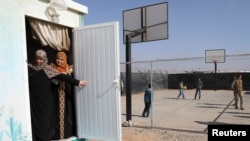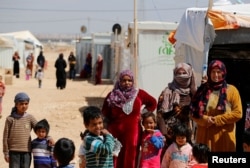Syrian refugee Mohamed Haj Ali speaks without emotion as he recalls the day last December when he found out that U.S. authorities had given approval for him to move there from Jordan with his wife and their four-year-old son.
He was told to attend cultural training so for five consecutive days the family woke at 5 a.m. and took a taxi 90 km (56 miles) to Amman to attend a course. It was supposed to be the last step of a screening process that lasted over two years.
"The group who was with us was made up of 20 families," Ali, 27, a former school teacher from Daraa, told Reuters in an interview in the Irbid flat his family shares with his mother and brother, his wife and two children. "All the families from that group traveled to the United States, except for me, my wife, and my son."
For Ali's planned move came too late — after U.S. President Donald Trump's decision to halt visas to seven Muslim-majority nations and for refugee resettlement for the sake of "national security" to head off attacks by Islamist militants.
On Jan. 27, days after his inauguration, Trump indefinitely banned refugees from Syria and temporarily banned refugees from all other countries. Federal courts have ruled against the ban, placing it on hold as Trump appeals the rulings.
The ruling impacted thousands of families, including Ali's.
Headlines have focused on families divided by borders or blocked in airports but many more lives remain in limbo with uncertainty of ever reaching the United States or putting down roots elsewhere to rebuild their lives.
"All traveling was on hold until further notice," said Ali, who had bought suitcases and sold many of his family's things in preparation for the move when the ban was announced.
The fact Ali's family was admitted into the resettlement process at all makes them exceptional. The United States took in nearly 12,500 Syrian refugees in fiscal 2016 that ended Sept. 30. Prior to Trump's election, expectations were for a higher number in 2017.
But this is a fraction of the Syrian refugee population.
Five million mark
In late March the U.N. refugee agency UNHCR said the number of Syrians fleeing to neighboring states and Egypt had passed the five million mark since 2011 when anti-government protests spiraled into conflict between rebels, Islamist militants, government troops and foreign backers.
The Jordanian government says it is home to 1.4 million Syrians of whom around 633,000 are registered with UNHCR.
But so far only 250,000 refugees have been resettled into other countries from the region — or about 5 percent.
Globally, almost 1.2 million refugees of all nationalities will need resettlement in 2017, 40 percent of them Syrians.
Ali arrived in Jordan in late 2012. His cousin Iyas had just been killed in the Syrian war and his mother feared for his life so he agreed to cross the border with his brother.
"We didn't take anything with us. ... Like most Syrians going to Jordan, we thought we were only staying for 10 or 15 days," said Ali, a soft-spoken young man with a neatly trimmed beard and intense eyes.
They were taken to the Zaatari refugee camp where Ali was shocked by the conditions and began volunteering with international non-government organizations (NGOs).
"My work made it bearable, because I was serving my community and God," he said.
After a year-and-a-half in the Zaatari camp, Ali married and had a baby. By then his father and younger brother had been killed in Syria and his mother and elder brother were living in Irbid, a city less than 20 km (12 miles) from the Syrian border which is now home to over 130,00 Syrian refugees.
Ali didn't want to leave his work with NGOs in the camp, but his family convinced him to join them for the sake of his infant son. He became a community health volunteer for the International Rescue Committee (IRC), assisting refugees and vulnerable families across Irbid.
It was around this time that the UNHCR approached him to ask if he would like to apply for resettlement in the United States.
Life in limbo
Ali, an economics graduate, decided to accept because he was concerned about a lack of free health care and education in Jordan.
Refugees are not allowed to work without a permit, which can cost between US$170 and US$1,270 and those caught working without a permit can be heavily fined or sent back to Syria.
"I thought I could leave to a European country or the United States and continue my masters and develop myself, and then return to my country when the war ends," he said.
The process was onerous. Every three months he and his wife Samah and son Khaled would get called for an interview in Amman, leaving Irbid before dawn to get there in time.
"They asked us every question one could ask," Ali recalled. "We continued having interviews for two years and eight months."
Ali heard about Trump's executive order through the news. No one called to tell him that plans had changed and he still hasn't received any formal explanation.
"And just like that, we're banned from America," he said.
Even if the United States starts to take Syrian refugees again, it may be too late for Ali. His wife has just had a second son so they would have to start the process again.
"I personally feel that I no longer want to go to the United States," Ali said. "They are telling us that they don't want us to enter their country ... why should I go to a country where I am not welcome?
"Any country that calls me now for immigration will be better than the United States," he added.






